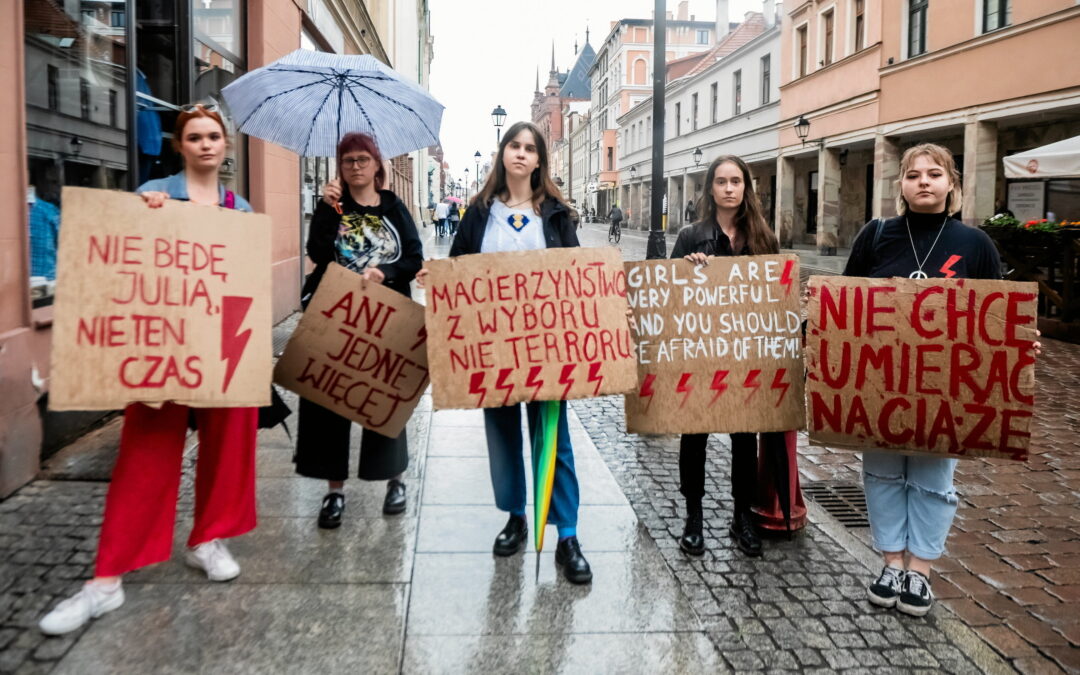Keep our news free from ads and paywalls by making a donation to support our work!

Notes from Poland is run by a small editorial team and is published by an independent, non-profit foundation that is funded through donations from our readers. We cannot do what we do without your support.
By Alicja Ptak and Christiaan Paauwe
Poland’s government came to power last year on a pledge to end the country’s near-total abortion ban. But one year after taking office, that promise remains unfulfilled, leaving many women disillusioned and doubtful of politicians’ commitment to changing the law.
Katarzyna had hoped that Poland’s 2023 parliamentary elections would usher in change. Opposition leader Donald Tusk had promised to end Poland’s near-total abortion ban and introduce abortion on demand within his first 100 days of office. He called women’s rights the “number one issue”.
After the elections, when Tusk’s centrist Civic Coalition (KO) formed a new government with The Left (Lewica) and the centre-right Third Way (Trzecia Droga), their coalition agreement included a pledge to end the near-total abortion ban.
“I thought that [abortion] would be the first thing they’d address,” Katarzyna, a 42-year-old who has been personally impacted by the abortion restrictions, tells Notes from Poland and Dutch broadcaster NOS. “It’s such an important social issue.”
Yet today – exactly one year after Tusk’s government was sworn into office – nothing has changed and Poland still retains the strictest abortion law of any EU country other than Malta.
Katarzyna says the government’s failure to deliver on its promise has made her reconsider voting for KO in future elections – and that next time, she might not cast her ballot at all.
Prime Minister @donaldtusk has admitted that there will not be a majority for the liberalisation of Poland’s abortion law during the current parliamentary term.
In its 2023 election campaign, Tusk's KO pledged to end the country’s near-total abortion banhttps://t.co/IGPrCdL6ew
— Notes from Poland 🇵🇱 (@notesfrompoland) August 26, 2024
Poland’s current abortion law is the result of a Constitutional Tribunal (TK) ruling in 2020 which outlawed terminations in cases where the foetus has serious and irreversible birth defects. Since the ruling came into force in 2021, abortion has been allowed only if the mother’s life or health is at risk, or in cases of rape or incest.
Four years ago, Katarzyna sought a termination after learning that her unborn son had Edwards syndrome, a genetic condition that would likely result in the baby’s death before or shortly after birth.
It was just a few months before the TK ruling, meaning that the abortion Katarzyna was seeking to obtain was still legal. She nevertheless faced a gruelling ordeal, with hospitals refusing to perform the procedure. Eventually, she was admitted after what she described as humiliating discussions and delays.
“I wouldn’t be eligible [for an abortion] now,” Katarzyna explains. “I would have had to carry him to term.”
A UN committee has published a report looking into possible human rights violations due to Poland's strict abortion law.
It found that the situation for women seeking abortion in Poland may constitute "torture or cruel, inhuman or degrading treatment”.https://t.co/4afA1bdnmi
— Notes from Poland 🇵🇱 (@notesfrompoland) August 27, 2024
Activists say that the strict law has had deadly consequences. Several women have died after hospitals appeared to delay abortions for fear of legal repercussions. Doctors, wary of prosecution, often err on the side of inaction.
Earlier this year, the UN’s Committee on the Elimination of Discrimination against Women found, after a three-year inquiry, that Poland’s restrictive abortion law violates the rights of women in Poland and may constitute “gender-based violence”.
Yet public opinion on the issue remains divided. Surveys show that a large majority are opposed to the current abortion law. However, they differ on what should replace it: some want abortion on demand, others favour a return to the pre-2021 law that allowed abortion in only three circumstances.
Those differences are present within the government, too. KO and The Left favour some form of abortion on demand. But parts of the Third Way, especially the conservative Polish People’s Party (PSL), prefer a return to the pre-2021 “compromise” law.
As a result of that internal dispute, Tusk admitted in August that during the current parliamentary term, which is due to run until 2027, it is likely to be impossible to introduce full abortion reform.
As a stop-gap measure, the government has instead issued guidelines clarifying that hospitals will not face prosecution for terminating pregnancies to save a mother’s life and begun fining hospitals that refuse to provide abortions allowed by law. Yet activists say these measures are insufficient.
“This is sticking a band-aid on an open wound,” says Mateusz Burzyński, a lawyer with the reproductive rights organisation Federa. “We appreciate it, but let’s be honest, without a change in the law, nothing will change permanently.”
“Abortion was a major motivator for young women to vote. But the government has given them nothing in return,” he adds.
Thousands joined protests against Poland’s near-total abortion ban yesterday following the latest death of a pregnant woman in hospital.
But the conservative authorities say the tragedy was caused by medical malpractice, not the abortion law https://t.co/dJFJn6O1Y4
— Notes from Poland 🇵🇱 (@notesfrompoland) June 15, 2023
A poll in June found that almost half of those who voted for the ruling coalition are disappointed that it has not yet followed through on its promise to liberalise the country’s abortion law. Such sentiment was particularly strong among young women.
An exit poll conducted by OGB Pro during those elections found that, for 16.5% of Poles, abortion and women’s rights was the key issue they considered when deciding who to vote for. That put it in joint-second place with national security and behind only the economy (27.8%).
Katarzyna says she voted for KO because some of its politicians supported the mass protests against the constitutional court ruling. But Tusk’s failure to deliver on his promise means his party won’t get her vote again.
“But it may be difficult to find anyone else to vote for,” she adds, citing what she sees as a lack of a “coherent programme” from left-wing parties.
🔈W badaniu Exit Poll OGB zapytaliśmy również o to, który temat miał największe znaczenie przy podejmowaniu decyzji w sprawie głosowania📷. Były to sytuacja gospodarcza oraz aborcja. Najmniej istotne za to były rola kościoła w państwie oraz afery związane z władzą… pic.twitter.com/xUqswQxsGl
— OGB Pro (@OGB_Pro) October 16, 2023
Bartosz Rydliński, a political scientist at the Daszyński Centre think tank, says those who last year voted for parties in the ruling coalition were clearly demotivated in this year’s local and European elections – in which the right-wing opposition performed strongly – and will likely remain disengaged in next year’s presidential elections.
“It is not as if Civic Coalition’s failure to deliver on topics important to their voters will cause them to start voting for PiS,” he says. Rather, they will just not vote at all. “These people will simply…say: ‘You guys didn’t give a damn about us, so we won’t give a damn about you’.”
Rydliński pins the blame on Tusk, who, he says, failed to lead on divisive issues like abortion and migration, prioritising power over delivering promises. He also claims that smaller coalition partners are at fault, accusing PSL of pandering to their conservative heartlands instead of considering the collective interests of the coalition.
Almost half of supporters of Poland’s ruling coalition are disappointed it has not followed through on its promise to liberalise the abortion law.
The same poll shows that over half of young Poles – who voted in record numbers last year – are disappointed https://t.co/6hAqQ7a5LE
— Notes from Poland 🇵🇱 (@notesfrompoland) June 20, 2024
PSL’s partner in the Third Way, the centrist Poland 2050 (Polska 2050), believes it can play a key role in resolving this impasse.
“If we are to change anything, to liberalise the right to abortion, both the most liberal and the most conservative [elements of the coalition]…should be willing to talk and make some concessions,” Żaneta Cwalina-Śliwowska of Poland 2050 tells Notes from Poland.
She says she stood for election for the first time last year in large part because of the abortion issue. “I believed I needed to take matters into my own hands.”
But she argues that the reality of working within a mostly conservative parliament means that any change to the abortion law will have to be introduced gradually and through compromise.
Parliament has rejected a bill that would have softened Poland's abortion laws after the most conservative party in Donald Tusk's ruling coalition joined the right-wing opposition in voting against it https://t.co/pJplnHhtZn
— Notes from Poland 🇵🇱 (@notesfrompoland) July 12, 2024
“That’s what it’s all about at the end of the day: to…come up with a solution for society that [parliament] will be able to accept,” she says. “You can’t simply persist on your entrenched positions, defending your views to the end and achieving nothing.”
Notes from Poland contacted all parties in the ruling coalition for comment, and despite repeated attempts, most did not respond to interview requests. After agreeing to be interviewed, a PSL MP did not show up.
The future of this issue will also depend on the outcome of the upcoming presidential election. Incumbent President Andrzej Duda, a PiS ally, has vowed to veto bills introducing significant liberalisation of the abortion law. But his second and final term ends next year.
Conservative President @AndrzejDuda has vowed to veto a bill softening Poland's abortion laws proposed by the more liberal governing coalition.
"For me, abortion is the killing of people," says Duda.
A vote on the abortion bill is scheduled for Friday https://t.co/5vam704uVW
— Notes from Poland 🇵🇱 (@notesfrompoland) July 10, 2024
The two leading candidates to replace him are KO’s Rafał Trzaskowski – a vocal supporter of abortion rights – and PiS-backed Karol Nawrocki, a conservative who says he supports “life from conception until natural death”.
For Katarzyna, the memories of her own struggle remain raw – not just because of the personal loss, but because conditions for all women in Poland have worsened as a result of the tightening of the abortion law.
Disillusioned with Tusk, she says she is doing “everything to make sure” that her two teenage daughters are aware of “the opportunity to live outside Poland,” in countries where women – and not politicians – can make decisions about their own bodies.

Notes from Poland is run by a small editorial team and published by an independent, non-profit foundation that is funded through donations from our readers. We cannot do what we do without your support.
Main image credit: Maciej Wasilewski / Agencja Wyborcza.pl





















